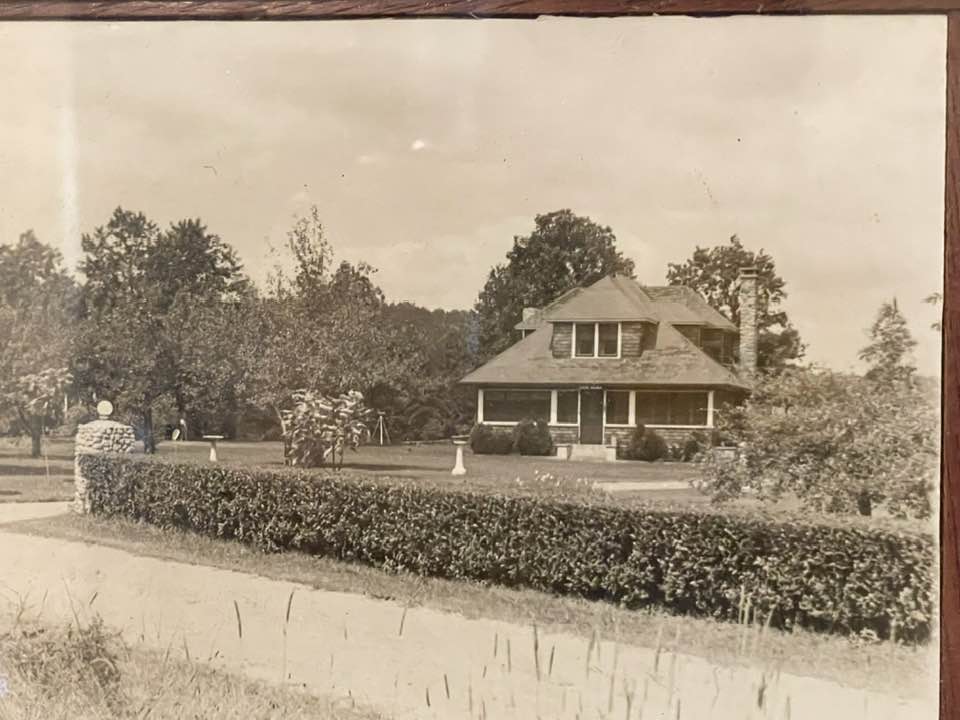AUGUST 28, 2024 – (Cont.) Over a century ago our great-grandfather oversaw tasteful landscaping of his property. The enhancements included a mix of flower and vegetable gardens, strategically placed shade trees, a small orchard, rose bushes, and a hedge along the 300-foot roadside border, interrupted by an entrance marked by twin stout stone-and-mortar pillars. On top of each pillar was a large simple frosted globe light for nighttime illumination. As revealed by a black-and-white photo taken in about 1920, the whole affair was pleasing to anyone with an appreciation for landscape aesthetics.
The scene captured by that photo was well maintained for over 20 years, at least, by the efforts of our grandparents’ three-in-one cook, driver and gardener. When our grandmother recalled his loyal service to the family, she called him “Jimmy.” A rare photo of him in a modest uniform, suggests cordiality and dedication along with loyalty. Based on stories our mother told about growing up in close proximity to the family business, all employees were always treated well—generously and respectfully. Jimmy’s smile and tenure no doubt reflected such treatment and his reciprocal quality of service.
I don’t know what happened to Jimmy. Presumably, as happens, he grew old and followed our great-grandparents into the sunset. Our grandparents didn’t replace him. Though Grandpa himself was plenty generous and charitable, as well as successful, in the Connecticut Yankee tradition of his ancestors, he knew how to pinch pennies. Why retain someone to mow the grounds and keep the hedge trimmed, for example, when he could do it himself? That worked for 10, maybe 20 years, but eventually he himself grew old and. Perfectly capable of demanding physical toil in his younger days, by the time I was in college, Grandpa was increasingly bound to paperwork and accounting tasks exclusively. Only later did I wise up to the reality that his late-night sessions at the dining room table, surrounded by briefcases, accounting paper and adding machines, he was sound asleep far longer than he wasn’t.
The hedge, meanwhile, grew out of control, and the next generation—namely our mother and uncle—didn’t pick up the slack. Though our uncle had inherited our great-grandfather’s love for gardening, Uncle Bruce was bereft of aesthetic judgment, at least of a version shared by the rest of the world. I eventually decided that he was “anti-aesthetical” for the sake of being a pain in the neck, just as he was a non-conformist in nearly every other aspect of his life except. Moreover, as the years passed his visits to The Escape Hatch became less frequent until they were rare.
I could never be entirely sure about mother’s aesthetic judgment, at least when it came to interior design and landscaping. She knew lots about art and said she loved artistic and natural beauty, but her custom of putting “cheap” stuff on display with haphazard attention to organization was inconsistent with my own view of how things should be. In any event, when it came to The Escape Hatch and its beautiful surroundings, she was noticeably detached. Her indifference was incongruous with what I knew (by way of stories) was just the opposite affiliation during her youth: back then she loved the place and spent long stretches of time here with her cousins next door, especially Robert Holman, who was her mentor and idol. Only much later in life did I come to understand the cause of her emotional shift: World War II. Robert died a hero in a B-17 over the English Channel. His cruel death robbed the family of its brightest light. Mother, for one, never got over it, and her mere presence at Upper Hamburg Cove reminded her of the unrelenting loss.
And the hedge grew even more out of control. (Cont.)
Subscribe to this blog and receive notifications of new posts by email.
© 2024 by Eric Nilsson
